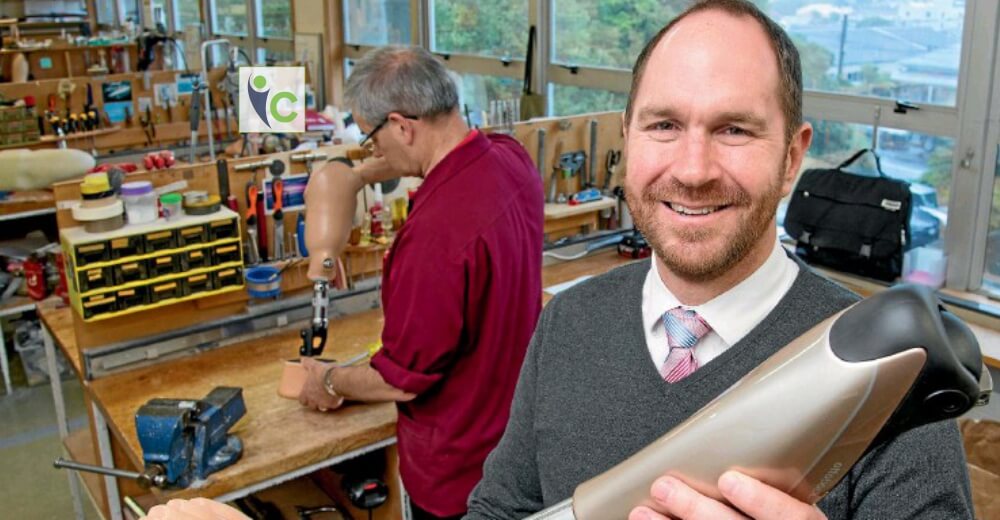The human body is an incredible biological machine, with each individual part performing a number of tasks, and losing a limb can have a considerable effect on our lives. In such a situation, a prosthetic limb can prove to be an invaluable device in restoring independence and productivity in an amputee’s life.
Recent advances in robotics and computing power have been incorporated into artificial limbs. Thus, the advanced prosthetic technology has forced a change in public attitudes, as it has bridged the gap between disability and ability. Also, the advancements have seen specialized treatment teams and better prosthetic devices which have improved the prospects of amputees.
A global, multidisciplinary, government agency aiming to improve the quality of life for persons who may benefit from prosthetic, orthotic, mobility, and assistive devices is, the New Zealand Artificial Limb Service (NZALS).
The Wellington based organization, NZALS, has built a global reputation as a developer, innovator and provider of prosthetics, and orthotic products. From supporting the developing a bionic arm to components that support the patients’ activities, the organization dreams big on technology-led solutions.
NZALS strives to give world-class service to the patients and aims to have representatives who are knowledgeable, courteous, and responsive to the patients they care for.
It mainly facilitates artificial limbs and orthotics, for individual patients with an integrated rehabilitation, and co-ordinated care service.
An Approach with a difference
Amputees at NZALS receive special treatment that is more equitable and delivers improved coordination of care. Its team comprises of prosthetic, orthotic, rehabilitation therapists, medical and nursing professionals. The team helps the patients to extend their innate body functions to live an independent and productive life.
For an individual suffering the hardships, catering to their rehabilitation and other special needs is as important as serving them their prosthetic needs. Thus NZALS’ rehabilitation therapy has been cardinal to amputees to maximise the benefit of the artificial limb they are provided with.
It has developed and implemented a unique programme which aims to serve each amputee with a special worker who trains and supports them to meet their needs.
Realizing the need for better support services, the organization has developed a Peer Support Service , www.peersupport.nz. The service provides patients with access to a trained amputee volunteer to help them cope with life-changing events and support their ongoing journey of rehabilitation.
Moreover, it has introduced psychology services for amputees. The service provides early psychological support recognized as one of the significant aspects in a patient’s rehabilitation journey.
Leading the Positive Change
Sean Gray, the CEO of NZALS has over 15 years’ experience in leading positive change for consumers within the prosthetics, disability, health, and medical device industries.
Sean is a proud member of the Be. Accessible Fab 50 network. He holds Master’s degree in Business Administration pursued from the prestigious Macquarie Graduate School of Management. Also, he has a bachelor in Applied Sciences from Massey University. At his heart, Sean is a consumer advocate and likes to use commercial approaches to get good outcomes for disadvantaged groups.
Apart from the professional experiences, Mr. Gray has a comprehensive experience and a proven track record in leading start up, health, sales, membership, marketing, and not-for-profit organisations.
Sean Gray presented on research at the Australian Orthotic and Prosthetic Association congress. It determines his and NZALS’ valuable contribution for the betterment of the individuals living with limb loss:
“A responsible approach to incorporating digital manufacturing into service delivery”
2018 AOPA Congress
“Drawing on the experiences and perspectives of amputees using microprocessor knees to inform policy and practice”
2019 AOPA Congress
“Combined prosthetic and orthotic service delivery model with input into high risk diabetes clinics”
2019 AOPA Congress
Wearing a Modern Look
The ability of science and technology to improve human life is known to everyone. Integrating innovation and developing advanced artificial limbs has made NZALS ever more productive.
It uses outcome measures to ensure that the prescription decisions are appropriate. Moreover, in follow ups, it ensures that the prescription is delivered to amputees and according to its expectations.
For instance, 175 Accident Compensation Corporation and District Health Board (non-diabetes and vascular) above knee amputees have been appropriately prescribed Microprocessor knees; this equates to 17.5% of above knee amputees in New Zealand.
The outcome data that is used to prescribe Microprocessor knees has delivered phenomenal benefits to patients:
Improved mobility by 6.3%
92% reduction in falls per week
Functional improvement of 88%
Aerobic capacity improvement of 15%
Reduction in pain by 28%
Healthcare Par Excellence
According to the organizations’ understanding, the prosthetics and orthotics industries are independent and managed externally by tertiary health systems.
To serve better, NZALS seeks alternative care pathways to achieve positive outcomes for the patients. In efforts to improve the lives of people living with diabetes, they have provisioned a new orthotic service contract in Waikato that has had a profound impact on patients in the region.
NZALS engages in multidisciplinary work done in collaboration with other healthcare providers. The Rehab Physicians and Surgeons are dual employed by NZALS and by local District Health Boards as well.
It also helps the patients overcome the mental trauma through the newly formed provision of peer support services. Given the quality of this peer support service, both Accident Compensation Corporation and District Health Boards have agreed to fund this service as a part of NZALS’ Artificial Limb Service contracts.
In 2019, CentralTAS undertook voluntary audit of NZALS to the World Health Organisation Orthotic and Prosthetics Standard, depending upon some important parameters. The overall rating verifies its admirable performance in the service delivery:
Audit Focus Policy Product Personnel Quality Mgmt Provision of services
Overall Rating Satisfactory Good Good Satisfactory Good
A Step for Wellness
Māori people – indigenous to New Zealand, particularly men, suffer from diabetes, and are three times more vulnerable to have an amputation than the national average. This problem arises in larger proportion due to lower access rates to early stage diagnosis, and due to cultural and economic barriers faced by them in seeking help.
In regard to the concerns, NZALS strives to build collaborative relationships with Māori people to improve their health outcomes. It is highly motivated to improve their responsiveness to the health needs and reduce the number of Māori amputees.
Lately, the organisation has started the consultation for its 2022-2026 Statement of Intent, which will reflect a Māori world view.













